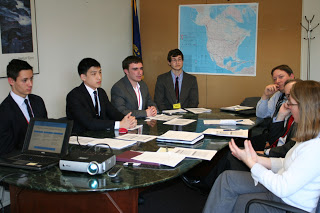- Public Policy
- Leadership
- Funding
- News & Events
- About the Center
Back to Top Nav
Back to Top Nav
Back to Top Nav
Back to Top Nav
 |
|||
| William de Chatellus ‘16, Peter Kim ‘13, Michael Sanchez ‘13, and Michael Altamirano ‘13 testify before the New Hampshire Department of Environmental Services in Concord, NH, on Wednesday, April 3, 2013. |
On Wednesday, April 3, 2013, four PRS students, Michael Sanchez '13, Michael Altamirano '13, Peter Kim '13, and William de Chatellus '16 from the Nelson A. Rockefeller Center Policy Research Shop, made a presentation in Concord, NH to the New Hampshire Department of Environmental Services (NHDES), including Commissioner Thomas Burack, Dartmouth Class of 1982, Craig Wright, Director of the Air Resources Division, and Michele Roberge, Administrator, Permitting and Environmental Health Bureau.
The students presented findings from their paper
.” Charged with regulating air pollutant emissions in New Hampshire through permits and fees, NHDES faces the challenges of declining emissions, reduced federal grants, and the need to generate revenue. This paper examines solutions from other states and how these solutions can be applied in New Hampshire. Following the presentation and questions from NHDES staff, the students and administrators discussed the implications of their research for decision making within NHDES over the next year, including how to adapt the current system of permits and fees to a changing environmental and policy context.
Students enter the Policy Research Shop via one of two policy research methods courses (PBPL 45: Introduction to Public Policy Research and PBPL 48: Policy Analysis and Local Governance) offered by the Nelson A. Rockefeller Center through its Public Policy Minor. Students begin projects brought to the classes by state and local policymakers from Vermont and New Hampshire. In subsequent terms following the conclusion of the classes, the PRS students complete these projects, prepare final policy briefs, and rehearse formal oral presentations. When the policy briefs and oral presentations are approved by faculty mentors, the students then travel to the state capitals (or to county or local governments) and present their findings to policymakers.